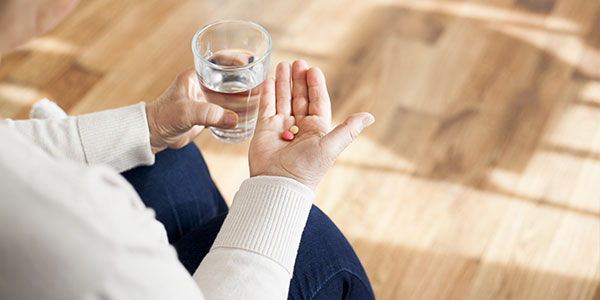Understanding Depression and Effective Treatment

Everyone experiences sadness from time to time. But depression lasts longer, interferes with daily life and can cause physical pain. Fortunately, depression is highly treatable, and getting effective treatment is crucial. This question-and answer guide explains depression and how it can be treated successfully.
How does depression differ from occasional sadness?
While everyone occasionally feels sad or "blue," these feelings tend to pass rather quickly.
By contrast, someone with depression experiences extreme sadness or despair that lasts for at least two weeks or longer. Depressed individuals tend to feel helpless and hopeless and to blame themselves for having these feelings. Depression interferes with activities of daily living—such as working or concentrating on tasks, or even eating and sleeping. Other possible symptoms of depression include chronic pain, headaches or stomach aches. Some people may feel angry or restless for long periods.
People who are depressed may become overwhelmed and exhausted and stop participating in certain everyday activities altogether. They may withdraw from family and friends. Some depressed individuals may have thoughts of death or suicide.
What causes depression?
A combination of genetic, chemical, biological, psychological, social and environmental factors likely contributes to the disorder. Depression is often a signal that certain mental, emotional and physical aspects of a person's life are out of balance. Chronic and serious illness such as heart disease or cancer may be accompanied by depression.
Significant transitions and major life stressors such as the death of a loved one or the loss of a job can help bring about depression. Other more subtle factors that lead to a loss of self-identity or self-esteem may also contribute. The causes of depression are not always immediately apparent, so the disorder requires careful evaluation and diagnosis by a trained mental health care professional.
Sometimes the circumstances involved in depression are ones over which an individual has little or no control. At other times, however, depression occurs when people are unable to see that they actually have choices and can bring about change in their lives.
Can depression be treated successfully?
Absolutely. Depression is highly treatable when an individual receives competent care. Licensed psychologists are highly trained mental health professionals with years of experience studying depression and helping patients recover from it. There is still some stigma or reluctance associated with seeking help for emotional and mental health problems, including depression. Unfortunately, feelings of depression often are viewed as a sign of weakness rather than as a signal that something is out of balance. The fact is that people with depression cannot simply "snap out of it" and feel better spontaneously.
Persons with depression who do not seek help suffer needlessly. Unexpressed feelings and concerns accompanied by a sense of isolation can worsen a depression.
Getting quality treatment is crucial. If depression goes untreated, it can last for a long time and worsen other illnesses. Even people with severe depression benefit from treatment.
What evidence supports the use of psychotherapy for treatment?
Many research studies have demonstrated that psychotherapy, or talk therapy, is effective for treating depression and relieving symptoms experienced by individuals who suffer from depression. Psychological treatments may prevent a person with milder depression from becoming more severely depressed. And although a past history of depression increases the risk of future episodes, there is evidence that ongoing psychotherapy may lessen the chance of recurrence.
How does psychotherapy help people recover?
There are several approaches to psychotherapy— including cognitive-behavioral, interpersonal and other kinds of talk therapy—that help individuals recover from depression. Psychotherapy helps people identify the factors that contribute to their depression and deal effectively with the psychological, behavioral, interpersonal and situational contributors.
Skilled health and mental health professionals such as licensed psychologists can work with individuals who are depressed to:
- Pinpoint the life problems that contribute to their depression, and help them understand which aspects of those problems they may be able to solve or improve. A licensed psychologist can help depressed patients identify options for the future and set realistic goals that enable them to enhance their mental and emotional well-being. Psychotherapy also can assist individuals who have been depressed in the past with identifying how they have successfully dealt with similar feelings.
- Identify negative or distorted thought patterns that contribute to feelings of hopelessness and helplessness that accompany depression.
- Develop skills to relieve suffering and prevent later bouts of depression. Skills may include developing or strengthening social networks, creating new ways to cope with challenges and crafting a personal self-care plan that includes positive lifestyle changes.
In what other ways do psychologists help individuals suffering from depression, and also help their loved ones?
Living with a depressed person can be very difficult and stressful on family members and friends. The pain of watching a loved one suffer from depression can bring about feelings of helplessness and loss.
Family or couples therapy may be beneficial in bringing together all the individuals affected by depression and helping them learn effective ways to cope together. This type of psychotherapy can also provide a good opportunity for individuals who have never experienced depression themselves to learn more about it and to identify constructive ways to support a loved one who is suffering from depression.
The support and involvement of family and friends can play a crucial role in aiding someone who is depressed. Individuals in the "support system" can encourage a depressed loved one to stick with treatment and practice the coping techniques and problem-solving skills he or she is learning through psychotherapy.
Are medications useful for treating depression?
Medications are helpful for reducing symptoms of depression in some people, particularly when their depression is severe. Some health care professionals treating depression may favor using a combination of psychotherapy and medications. Given the side effects, any use of medication requires close monitoring. Psychotherapy is often recommended as a first line of treatment for children and adolescents, especially those with mild to moderate depression. Further, some adults with depression may prefer psychotherapy to the use of medications if their depression is not severe. By conducting a thorough assessment, a licensed and trained mental health professional can help make recommendations about an effective course of treatment for an individual's depression.
Depression can seriously impair a person's ability to function in everyday situations. But the prospects for recovery are good for individuals with depression who receive appropriate professional care.
Reprinted under guidelines by the American Psychological Association (APA). Click here to view the article at the APA web site.
The American Psychological Association gratefully acknowledges the assistance of Daniel J. Abrahamson, PhD, Lynne M. Hornyak, PhD, and Lynn P. Rehm, PhD, in developing the original version of this fact sheet on depression.



























